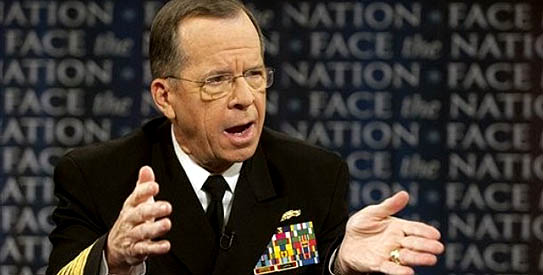
WASHINGTON: Pakistan is going to reduce sharply the number of US military trainers allowed in the country, the top US military officer said on Thursday, acknowledging strains in the uneasy alliance a month after the killing of Osama bin Laden.
Admiral Mike Mullen, outgoing chairman of the Joint Chiefs of Staff, declined to offer figures on Pakistani plans to cut the military mission but said the number of US trainers was “not going to zero.”
“There clearly is an ongoing contraction of that support and it is tied to the difficult time we are going through,” Mullen, who steps down on Oct. 1, told defense reporters in Washington.
Pakistani and US military sources in Pakistan have said the training component of the US military mission in Pakistan numbered as high as about 150 in recent years and would be reduced to less than 50. It was about 70 in April.
Pressed for a figure, Mullen said only he saw “a very significant cutback” and refused to elaborate.
The reduction in US trainers is one of the tangible signs of a strained alliance that Washington still sees as critical to its success in the war in neighboring Afghanistan as well as the fight against al Qaeda and its affiliates.
The May 2 raid that killed al Qaeda leader bin Laden at his compound in Abbottabad, 30 miles (50 km) northwest of Islamabad, intensified US questions about Pakistan's possible role in sheltering militants.
Mullen renewed assurances the United States had no information that would implicate senior Pakistani military and political leadership, but acknowledged tensions between Washington and Islamabad remained high.
“We're going through a pretty tough time right now and that's going to continue,” he said.
Mullen also appeared to ask for patience, amid demands from Congress for more concrete results of America's outreach to Pakistan that has included billions in US aid.
“I think it's probably too soon (for the relationship) to pay off, if you will. Because we haven't been re-engaged with them for that long,” Mullen said, adding there had been only three or four years of serious re-engagement with Islamabad.
“I don't know what the right amount of time is but I know that sticking with it is absolutely vital.”
Afghan Drawdown
Mullen's comments come as the Obama administration prepares to start withdrawing troops from Afghanistan in July. Mullen said General David Petraeus, who is running the Afghan war effort, had yet to provide his proposal to President Barack Obama.
“I can honestly say nobody knows what the answer is at this particular point in time. And, in the end, this is a decision for the president and nobody else,” Mullen said.
Some current and former US officials say Obama could easily announce a pullout of at least 10,000 troops over the next year from the 100,000-strong US force in Afghanistan, trying to capitalize on gains against the Taliban in southern Afghanistan and bin Laden's killing.
Mullen acknowledged that costs of the Afghan war would be a factor in the discussion, given US fiscal woes. But he appeared to play down bin Laden's death as a near-term factor in Afghanistan.
“I think it's way too early to assess, to accurately assess, the impact of bin Laden's death -- in Afghanistan, in Pakistan, in the overall campaign,” he said.
Much of the US military effort in Afghanistan is being undermined by Pakistan-based militants like the Haqqani network. The Haqqanis use safe havens in Pakistan's North Waziristan region to stage cross-border attacks against American troops in Afghanistan, and US officials have accused Pakistani intelligence of ties to the group.
One of Pakistan's top military commanders on Wednesday ruled out an imminent offensive in North Waziristan, long a top demand by Washington.
Mullen told reporters an offensive was not the only way to resolve problem of the Haqqanis.
“I think there is a mix of both a campaign requirement, if you will, to take them off the battlefield as well as a political solution long term as to how this is resolved,” Mullen said.












































Dear visitor, the comments section is undergoing an overhaul and will return soon.